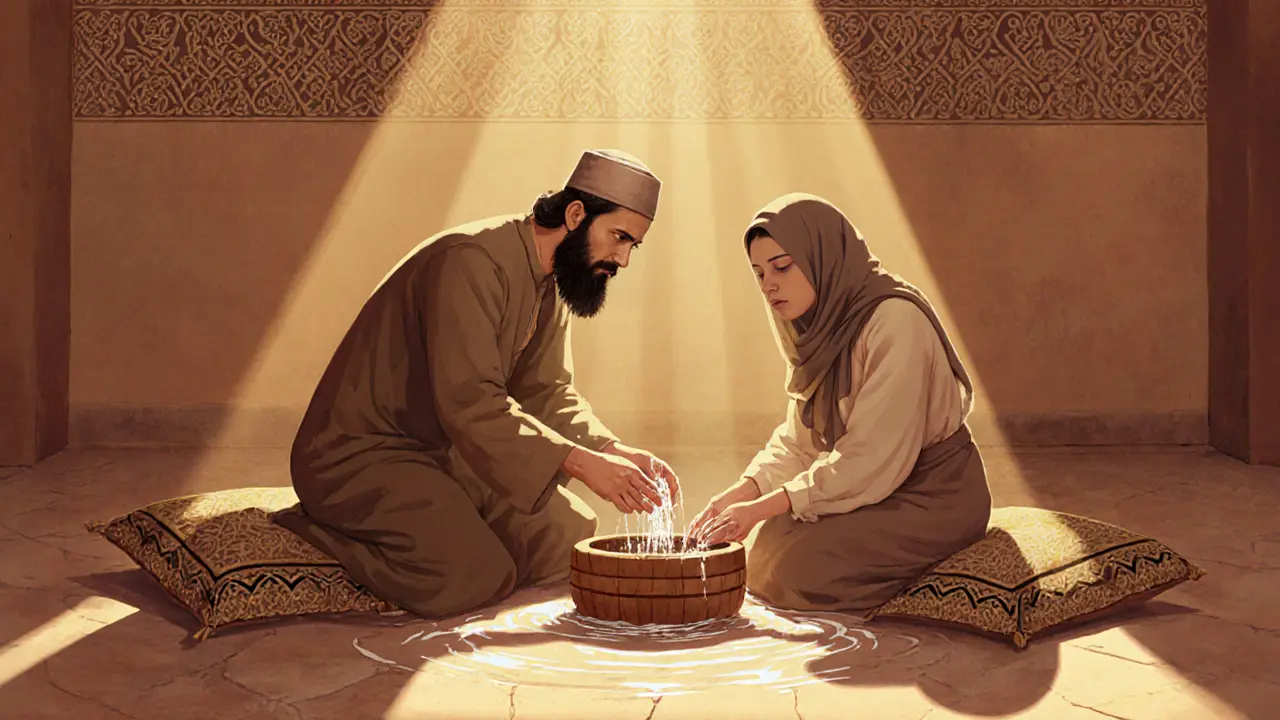husband wash wife islam is a question many couples wonder about, especially when they’re looking for intimate ways to care for each other while staying true to their faith. In this guide we’ll unpack what the Qur’an, Hadith, and classical scholars say about a husband washing his wife’s body, outline the practical steps, and flag the key etiquette you should keep in mind.
Understanding the Basics of Spousal Washing in Islam
Origins and History
Islamic teachings on personal hygiene trace back to the Prophet Muhammad (peace be upon him). Numerous Hadith describe the Prophet assisting his wives with washing, grooming, and even massaging. These narrations show that caring for a spouse’s physical comfort is viewed as an act of love and mercy, not a taboo.
Core Principles or Components
Three pillars shape the ruling:
- Modesty (Haya): Both partners must maintain decency and avoid exposing private parts to non‑mahram (unrelated) people.
- Consent: Any act of washing requires mutual agreement; forced intimacy contradicts Islamic ethics.
- Cleanliness (Taharah): The act should promote purity, especially before prayers where Ghusl (full‑body ritual bath) may be required.
How It Differs from Related Practices
Spousal washing is distinct from general bathing (Ghusl) and from masah (wiping over the head during Wudu). It is a private, intimate act rather than a ritual requirement. Below is a quick side‑by‑side look:
| Practice | Key Requirement | Primary Benefit |
|---|---|---|
| Spousal Washing | Mutual consent, modesty, clean water | Strengthens marital bond, promotes hygiene |
| Ghusl | Full body immersion or washing | Ritual purity for prayer, after major impurity |
| Masah (Wudu wipe) | Wiping head/feet, not full wash | Daily purification before salat |
Who Can Benefit?
Any married Muslim couple can incorporate this practice, but it’s especially valuable for:
- Couples seeking a loving, non‑sexual way to show care.
- Individuals recovering from illness or mobility issues who need assistance.
- Those who want to fulfill the Prophet’s example of compassion.
Benefits of Spousal Washing for Marital Life
Emotional Connection
Physical care triggers oxytocin, the “bonding hormone.” When a husband gently washes his wife’s body, both partners experience a deeper sense of trust and affection. Scholars highlight this as a practical way to fulfill the Qur’anic injunction to “live with them in kindness” (Qur’an 30:21).
Enhanced Hygiene
Regular washing removes dead skin cells, reduces infections, and can be part of a larger Ghusl routine before major prayers. The Prophet’s own practice of cleansing his wives after travel demonstrates its health value.
Spiritual Reward
Acts of care count as hasanah (good deeds). A hadith narrated by Aisha (RA) notes that the Prophet praised a man who helped his wife bathe, promising reward equal to that of a charitable act.
Practical Benefits
Beyond romance, spousal washing can aid:
- Post‑surgery recovery - gentle water flow helps prevent bruising.
- Skin conditions - controlled temperature and mild soaps soothe eczema.
- Elderly care - maintaining dignity while ensuring cleanliness.
| Benefit | Description | Impact |
|---|---|---|
| Emotional Bonding | Increases intimacy and trust | Stronger marital satisfaction |
| Physical Cleanliness | Removes dirt, reduces infection risk | Better health outcomes |
| Spiritual Merit | Counts as a good deed | Increased reward in the hereafter |
| Caregiving Support | Aids those with limited mobility | Maintains dignity and hygiene |
What to Expect When Engaging in Spousal Washing
Setting or Context
Choose a private, warm space-your bedroom or bathroom works well. The room should be free of non‑mahram witnesses. Light candles or soft music can help create a soothing atmosphere without violating Islamic modesty.
Key Processes or Steps
- Discuss intentions openly; ensure both partners feel comfortable.
- Gather clean, warm water, mild soap, a soft towel, and a non‑slip mat.
- Start with the hands: wash them together as a symbolic gesture of unity.
- Gently wet the body, beginning from the head and moving downwards, respecting privacy (covering the ‘awrah’ appropriately).
- Rinse thoroughly and pat dry with a clean towel.
- Finish with a brief prayer of gratitude if desired.
Customization Options
Couples can add aromatherapy oils (halal‑certified), use a handheld showerhead for better control, or incorporate light massage to relieve muscle tension. The core rule remains: no exposure to non‑mahram and full consent.
Communication and Preparation
Ask simple questions beforehand: “Do you prefer warm or cool water?” “Any particular area you’d like me to avoid?” Clear dialogue prevents misunderstandings and upholds the Islamic value of mutual respect.

How to Practice Spousal Washing Correctly
Setting Up for Success
Clear the floor, lay down a non‑slip mat, and keep a towel within arm’s reach. Test water temperature with your hand before inviting your spouse to step in. A tidy space reduces accidents and shows care.
Choosing the Right Tools
Use:
- Soft, hypoallergenic soap (halal‑certified if possible).
- Plush towels that don’t irritate the skin.
- A handheld shower head for precise flow.
Step‑by‑Step Guide
- Islamic jurisprudence is the study of legal rulings derived from the Qur’an and Sunnah confirms that washing a spouse is permissible if done modestly and consensually.
- Both partners perform wudu (partial ablution) to start in a state of purity.
- Invite your spouse to sit or lie down comfortably, covering the ‘awrah’ (private parts) with a modest cloth.
- Pour warm water over the shoulders first, then glide down the arms, chest, and back, always keeping a cloth over intimate areas.
- Apply a small amount of soap, lather gently, and rinse thoroughly.
- Pat the body dry, respecting the order of modesty, and finish with a brief dua.
Tips for Beginners or Couples
- Start with a short session-10‑15 minutes-to get comfortable.
- Maintain eye contact only when necessary; focus on the act of care.
- If either partner feels shy, begin with washing hands and forearms only, then expand.
- Remember that the intention (niyyah) to please and care for each other is what earns reward.
Safety and Ethical Considerations
Choosing Qualified Resources
If you’re unsure about the proper etiquette, consult a trusted scholar or a reputable Islamic counseling center. Many mosques offer guidance on marital etiquette.
Safety Practices
| Practice | Purpose | Example |
|---|---|---|
| Check water temperature | Avoid burns | Test with elbow |
| Use non‑slip mat | Prevent falls | Place rubber mat on floor |
| Maintain privacy | Uphold modesty | Close doors, no recordings |
| Ask for consent | Respect autonomy | Confirm willingness each step |
Setting Boundaries
Both partners should discuss limits beforehand-e.g., which body parts are comfortable to be touched. Boundaries can evolve, so revisit the conversation regularly.
Contraindications or Risks
Avoid spousal washing when either partner is:
- Experiencing a contagious skin infection.
- Unconscious or heavily sedated.
- Under legal restriction (e.g., a court‑ordered protection order).
In such cases, seek professional medical or legal advice.
Enhancing Your Experience
Adding Complementary Practices
Pair washing with dua (supplication) or light Quranic recitation to deepen spiritual connection. Some couples also incorporate a short period of gentle massage after washing.
Collaborative or Solo Engagement
If one partner cannot perform the washing, it’s permissible for the other to do it alone-provided consent is given. Solo bathing remains a personal act of purity.
Using Tools or Props
Consider a handheld shower head for precise control, a soft loofah for exfoliation, or a scented (halal) oil for a calming aroma.
Regular Engagement for Benefits
Making spousal washing a weekly habit can reinforce trust, improve skin health, and keep the habit of mutual care alive. Consistency also builds a routine that’s easy to maintain alongside busy Dubai life.

Finding Resources or Experts
Researching Qualified Scholars
Look for scholars affiliated with recognized institutions such as Al‑Azhar, the Islamic University of Madinah, or local UAE Darul Uloom centers. Verify their credentials via official mosque websites.
Online Guides and Communities
Reputable Islamic Q&A platforms (e.g., IslamQA, SeekersGuidance) often have threads discussing marital hygiene. Forums for married couples in the UAE can also share practical tips.
Legal or Cultural Considerations
In the UAE, public indecency laws are strict. All washing must stay within the private home, and any recording or public sharing is illegal. Respect cultural expectations of modesty, especially when inviting a partner from a different background.
Resources for Continued Learning
- Book: “The Rights of Women in Islam” by Ibn Taymiyyah (modern translation).
- Video series: “Prophetic Marriage Etiquette” on YouTube (verified Islamic channel).
- Workshop: Local family counseling center in Dubai offers monthly marital wellness sessions.
FAQ: Common Questions About Spousal Washing in Islam
Is it permissible for a husband to wash his wife’s entire body?
Yes. Islamic sources show the Prophet (peace be upon him) helped his wives bathe. The act is allowed as long as it’s done modestly, with consent, and no exposure to non‑mahram individuals.
Do we need to perform Ghusl after washing each other?
Ghusl is only required after major impurity (e.g., sexual intercourse, menstruation). Simple spousal washing for comfort does not obligate a full ritual bath unless a specific condition demands it.
What if one partner feels shy or uncomfortable?
Consent is essential. If either spouse feels uneasy, they should communicate honestly and can limit the washing to certain areas or postpone it entirely. The Prophet emphasized kindness over obligation.
Can we use scented oils during the wash?
Yes, provided the oils are halal and do not contain haram ingredients. Light, natural scents can enhance the experience without contravening Islamic guidelines.
Is this practice recommended for older couples?
Absolutely. Helping an elderly spouse with bathing is considered an act of compassion. Many scholars view it as a form of caring for the older partner’s dignity, earning spiritual reward.
Conclusion: Why Spousal Washing Is Worth Exploring
A Path to Deeper Intimacy
Beyond the physical, washing each other taps into the Qur’anic ideal of living together in mercy and kindness. It’s a simple ritual that can transform a routine act into a moment of love and spiritual growth.
Try It Mindfully
Start with a short, consent‑rich session, keep the environment modest, and remember the intention behind the act. If doubts arise, a quick chat with a knowledgeable scholar can provide peace of mind.
Share Your Journey
Have you tried spousal washing? Drop a comment below and let others know how it impacted your marriage. Follow our blog for more practical Islamic lifestyle tips and feel free to explore related articles on marital etiquette.
Disclaimer: Some links may be affiliate links, but all recommendations are based on research and quality.


Amy Black
October 22, 2025 AT 16:17The guidance on mutual consent is spot‑on.
Elle Daphne
October 23, 2025 AT 14:30Wow, what a comprehensive guide! 🙌 It really breaks down the steps so clearly-you’ll feel confident setting the scene, gathering the right supplies, and keeping everything modest and loving. Remember, a little extra warmth and a gentle tone can turn a simple wash into a beautiful act of caring. Keep the conversation open, and you’ll both enjoy the intimacy without any awkwardness. 🌟
La'Sherrell Robins
October 24, 2025 AT 12:44Yo fam! This article is lit 🔥-it shows that washing your bae ain’t just “just laundry,” it’s a full‑on love‑ritual. The Prophet’s vibe of caring for the wifey is sooo on point, and y’all can totally copy that vibe at home. Just make sure you don’t splash everywhere 😂, keep it modest, and sprinkle some halal‑certified oils for that extra sparkle. Trust me, the oxytocin boost is real, and you’ll both be vibin’ off that good energy! 💧💖
Nick LoBrutto
October 25, 2025 AT 10:57One point worth noting is the consistent use of the term ‘awrah’ throughout the article; it’s correctly italicized to highlight its significance. Also, when listing steps, parallel structure helps readability-e.g., “Gather water, gather soap, gather towels” rather than mixing verb forms. The article does a solid job maintaining a neutral tone, which suits the subject matter well.
Tatiana Pansadoro
October 26, 2025 AT 08:10Great catch on the parallel structure!!! And yes, the term ‘awrah’ really anchors the modesty discussion!!! It’s awesome to see someone pay attention to these subtle details!!!
Cynthia Farias
October 27, 2025 AT 06:24While the enthusiasm displayed is commendable, let us not overlook the underlying epistemological framework that governs such intimate practices. The discourse, when examined through the lens of jurisprudential methodology, reveals a harmonious interplay between textual sources and lived experience. Consequently, the articulation of consent and modesty must be grounded in a nuanced understanding of both legal theory and ethical comportment.
Paul Addleman
October 28, 2025 AT 04:37Indeed, integrating scholarly insight with everyday compassion can deepen the bond between partners. By approaching spousal washing as both a ritual and a relational exercise, couples empower themselves to embody the prophetic example of kindness. Let the knowledge guide your actions, and let love guide your hearts.
Justin Green
October 29, 2025 AT 02:50Just a quick note: “Gather clean, warm water” could be tightened to “Gather clean, warm water” without the comma for smoother flow. Otherwise, excellent work!
Cailee Garcia
October 30, 2025 AT 01:04Oh sure, because what every couple desperately needs is a step‑by‑step tutorial on how to turn a bathroom into a spa‑like stage for marital performance art. First, you’ll need candles, soft music, and a “non‑slip” mat-because obviously, slipping is the only thing that can ruin the sacred vibe. Then, there’s the whole “mutual consent” thing, as if we needed a reminder that a spouse isn’t a rubber duck you can scrub at will. The guide even mentions “halal‑certified” oils, because the market for scented, shrine‑approved lubricants is apparently thriving. And let’s not forget the obligatory table comparing spousal washing to ghusl and wudu-because nothing says romance like a scholarly chart. The article throws in a “15‑minute starter session” suggestion, which is perfect for those who love to have their bathroom time timed like a gym circuit. Of course, every step is peppered with Qur’anic verses and hadith references, because spiritual validation is the ultimate garnish. It even advises you to perform wudu before you start, ensuring you’re ritually pure enough to handle the intense emotional labor of scrubbing a back. The safety tips are a masterpiece-check water temperature, use a non‑slip mat, keep doors closed-basically a checklist for a chemistry lab. If any of this sounds overwhelming, just remember the article promises spiritual reward equal to charitable acts, so you can feel guilt‑free about the time spent arranging towels. And should you decide to skip any of these steps, the guide suggests consulting a scholar, because obviously, you need an academic endorsement for a simple wash. In summary, if you’ve ever dreamed of turning intimacy into a bureaucratic procedure, this post is your holy grail. So go ahead, set the scene, respect the ‘awrah’, and may your bathroom be ever blessed.